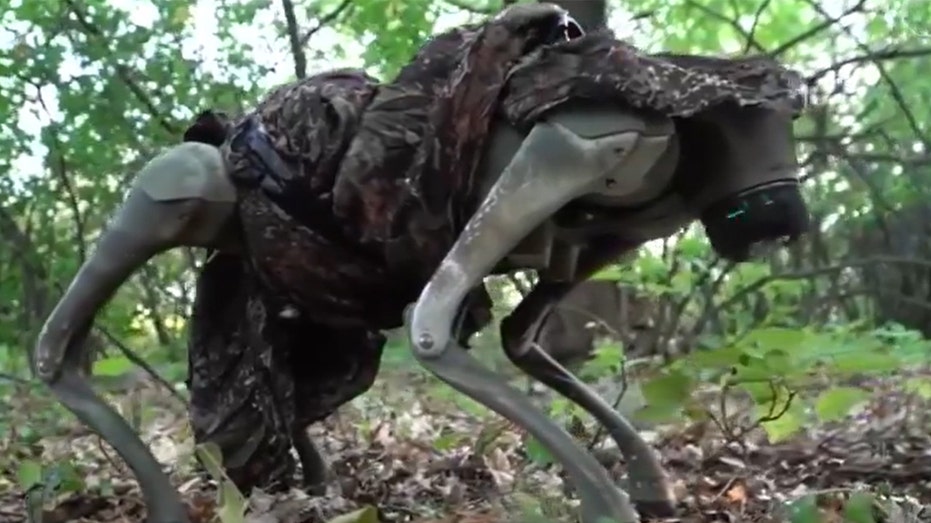Ukraine shows off capabilities of new drone-dropped, flamethrowing robotic war dogs: video
The Ukrainian Ministry of Defense shared a video of a robotic war dog being used in the field with a soldier, who was able to take advantage of the device's thermal imaging.

The Ministry of Defense in Ukraine took the opportunity this week to highlight the capabilities of its newest assets to help in the fight against Russia: robotic dogs with the option of adding flamethrowers to their arsenal.
The robotic "war dogs" were provided to Ukraine by the United Kingdom, and according to manufacturer Brit Alliance, the dogs have already exhibited exceptional mobility and agility crucial for traversing complex and hostile environments.
The dogs have the ability to navigate through debris, climb obstacles and move stealthily across open ground.
In a video posted to X on Monday by UkraineNewsLive, a drone is shown delivering a "combat robot scout" to a field in an undisclosed location. Once on the ground, the robotic dog rises onto its feet and walks in place.
Another video shared by the Ministry of Defense in Ukraine and posted by the armed forces Khortytsia unit shows a dog accompanying a Ukrainian soldier. The soldier is then seen using the dog's thermal imaging camera to conduct surveillance in a wooded area.
The dogs in both videos are part of Ukraine’s combat unit dubbed "Medoid."
In August, Ukraine unveiled the British second-generation Brit Alliance Dog (BAD2), which took to the battlefield, utilizing remote-sensing technology and a thermal-infrared camera to navigate the tricky landscape and perform a wide range of wartime tasks, such as delivering equipment or reconnaissance.
COLORADO POLICE DEPARTMENT SHOWS NEW WAYS TO USE DRONES FOR LAW ENFORCEMENT
Ukrainian troops have taken over 30 of the dogs, which are effectively sophisticated land drones. Each unit costs around $9,000 to produce, and Brit Alliance has promised to update the units based on feedback from the Ukrainian troops.
Brit Alliance said in August that it believes the battlefield demonstration of the BAD2 unit will help turn it into a "cornerstone of modern military logistics." The unit can move at just over 9 mph and move for five hours to a distance of over two miles, according to East2West.
Cleveland, Ohio-based Throwflame sells a version of the robotic dog called the Thermonator, which is outfitted with a flamethrower. The dog sells for about $9,420.
US, UK AND AUSTRALIA TAKE NEXT STEP IN INTEGRATING AI DEFENSE SYSTEMS
According to the company, the dog can be used for things like controlling and preventing wildfires and removing snow and ice.
Drones have increasingly played a pivotal role in the conflict for Ukraine, which has found drones a means of getting better return on its investment as the conflict drags on, and each side needs to prove more resourceful.
Ukraine deployed the "Sea Baby" drone earlier this year to try to destroy the Crimean Bridge, causing structural damage with the naval drone that has a one-ton payload and can travel up to 62 mph, according to Ukrainian outlet EuroMaiden Press.
Russia has responded in kind with its own land-based drones, but those models resemble remote-controlled cars. The drone, known as Scorpion-M, also has kamikaze capabilities and has seen increased use in the Donetsk region over the summer.
The Scorpion-M can carry up to 55 pounds of explosives and has been used to destroy underground hideouts and other facilities that conventional bombing has had trouble hitting. Experts touted the drone’s maneuverability, but they noted that the real advantage is the difficulty in jamming the units.
In that sense, the BAD2 will have similar advantages, plus better maneuverability: Christopher Alexander, a U.S. Army vet with experience in Strategic Operations Command, previously told Fox News Digital that he found it difficult to imagine "anyone in the current state of technology or deploying these things at the company/battalion level."
Fox News’ Peter Aitken contributed to this report.















